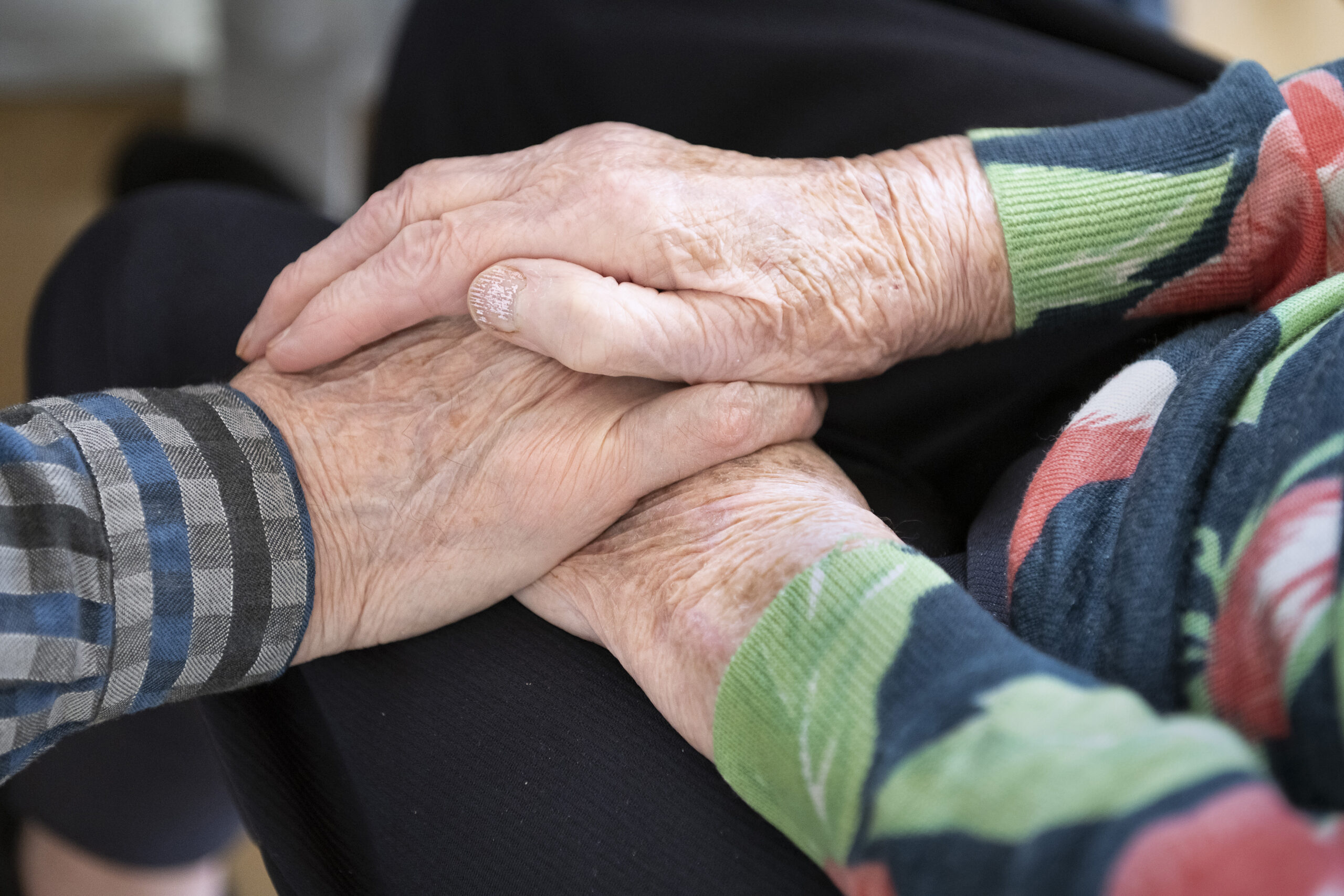My Elderly In-Laws Fell Prey to a Parasitic Care ‘Platform’
They’re exploiting Britain’s care crisis.
by Alexander Ratcliffe
30 April 2025

The hospital confirmed what we’d feared: John’s second broken hip in a year. An operation giving my father-in-law a new one was followed by a gruelling summer in a rehab unit, where he was determined to learn to walk again. Every day, we took his wife, Jennifer*, also in her eighties, also enduring Parkinsons, in a taxi to visit his horribly hot bedside.
After three months, the doctors said they’d got John as far as they could. But they wouldn’t discharge him unless care arrangements were in place. While they could start the process of organising that, it might take a year to materialise. If we didn’t arrange something private, he’d be stuck in this tiny, overheated room.
Fortunately, when John and Jennifer had moved from London to live nearer to us, they’d sold the family home, leaving money to pay for care. We looked into our options: most agencies offer a drop-in service, someone who swings by twice a day. But a company called Elder would introduce you to live-in carers – and that’s what we needed. We showed John and Jennifer short videos of women talking about how they would work, and they chose one. It wasn’t long before Agnes* arrived, and moved into their spare room.
Elder’s model seems pretty simple at first: you pay the company a lump sum every month, they pay the carer. Agnes – who, like almost every carer we’ve met through Elder, comes from southern Africa – is robust, funny, and a great cook. Soon, it became clear we needed a night carer too, and so Elder sent Dambisa*, who’s also great.
But there were problems. First, both carers were self-employed, and got no holiday or sick pay. Second, while Elder had told us our invoices would include a breakdown of what the carers were getting and what fees they were claiming, the company initially only included a generic pie chart, and then stopped including anything. When we got to know Agnes and Dambisa well enough to ask them, it became clear that about a third of what we were paying in total was being skimmed off by HQ. That is, about £700 a week.
Perhaps, if Elder had provided some support for that money, it would be reasonable. But after the initial introduction, I can’t think of anything Elder did in exchange for this fee. Nor can Agnes. Sitting in my in-laws’ kitchen, I asked her what support she’d had from Elder in the roughly two years she’d cared for them. “Zero.” she says, emphatically. “Not one call asking, ‘What difficulties are you facing?’ ‘How can we support you?’ No support whatsoever at any point in time. They’ve not once asked me, ‘Which part of your job do you struggle with the most? Where can we assist you?”.
My father-in-law finds his situation frustrating, and can display challenging behaviour – a fact which Agnes reported to Elder. “You need to know how to manage this. Not once did they [Elder] say, ‘We are aware you have these challenges. What kind of support do you think you would need?’” At no point was she offered expert advice, or any other kind of help relevant to her situation. “You are on your own,” she says.
Agnes and Dambisa say Elder also encourages carers to overwork far beyond what might be typical in a salaried job, including getting bonuses if they log a long streak without taking a break. A bit like Duolingo, only for exploited migrant labour.
It hasn’t always been like this. Historically, Agnes explains, carers were directly employed by agencies: “You’d get your holiday pay, you’d get your benefits”. These agencies are largely local to an area.
In the last ten years or so, “these platforms, they call themselves, started to get into this market”. Elder was founded in 2015 by a corporate lawyer, who had previously founded Mopp.com, a platform for cleaners. “They are very clever, the way they have designed their hub,” says Agnes, highlighting how, for people who move to Britain from abroad, the flexibility of being freelance can feel like an advantage at first – you can go back home for a month if you want to. But “they don’t take responsibility for you – you’ve got to manage your own tax, your sick pay, everything like that”.
The advantage for families is obvious. On its website, Elder says its services are, on average, “35% cheaper than traditional alternatives”.
While a few companies now operate this way, Elder is “trying to dominate the market”, Agnes says. “If you Google ‘live-in carer’, Elder probably comes out top,” she adds. I tried this myself, and it comes second, alongside a rival.
These companies don’t ‘employ’ carers. “They ‘match’ you,” says Agnes – a bit like online dating.
In reality, Agnes says, for her at least, even the “matching” process involved the minimum of input from Elder. She went to Elder’s office in London once, had a brief interview, and made the video we saw. The only in-house training Elder offers staff is online. “They don’t know anything about me,” she adds. These people are then sent into difficult, and intimate caring situations, with almost no support.
My wife and I had slightly more contact from the company than Agnes, in the form of a monthly, automated email, asking us to update my in-laws’ profile on their site. In more than two years, we maybe had two phone calls to check how things were going. Not once did Elder bother to contact John or Jennifer.
After they arrived, Agnes and Dambisa quickly started lobbying us to do the obvious thing – cut out Elder, and pay them directly. But our contract with the firm made clear that if it caught us doing this at any point in the future, we would have to pay them six months of their fee – that is, more than £18,000. My frail, elderly in-laws were obviously worried about doing this, and for two years, we found ourselves in the ridiculous position where not only were they paying these exorbitant agency fees, but also paying the carers some of the holiday pay the agency denied them.
As we approached the second anniversary of Agnes’s arrival, we began to think about the question again. Under employment law, there are various conditions which describe whether someone is genuinely self-employed, or if they are in fact an employee, with the legal rights that brings. As we researched this, and looked at the specifics of how Agnes and Dambisa’s work was arranged, my wife and I came to a simple conclusion: they weren’t self-employed.
ACAS, for example, lists six criteria which would have to be met for someone to be truly self employed. Agnes and Dambisa definitely don’t meet three of them, and the other three are arguable. They were legally entitled to paid holidays, sick pay, a pension and paid time off. Their taxes should be PAYE. But, we realised, if the carers took the case to a tribunal, the conclusion would likely be that it wasn’t Elder who was the employer. It was people in whose home they worked, and who ultimately paid them: my in-laws.
It turns out that this is a common problem. The Low Income Tax Reform Group, which helps people who can’t afford professional tax advice, warns on its website that introductory agencies often claim the carers they introduce you to will be self-employed, but that this is usually untrue, and it’s up to the recipient of the care to check the status for themselves.
We came to the belief, therefore, that Elder had left my in-laws in a position where they were obliged by a contract to break employment law. Of course, neither of us is a judge, and this hasn’t been tested in a tribunal, which is the only place it could really be decided. But my wife does have a law degree. And this is the view we both came to.
And so ultimately, we told Elder we didn’t need its services anymore. And, without telling the company, in breach of our contract, we employed Agnes and Dambisa directly. By that point, in total, on top of the carers’ wages, my elderly in-laws had paid around £75,000 to the firm.
In reality, it seems unlikely to me that any carer would go to a tribunal. Every carer we’ve met through Elder came from an African country, and intends to return once they’ve saved enough money. People with precarious work visa situations tend not to cause a fuss, and are more likely to accept terrible conditions.
“I think there’s some exploitation, and that’s why they recruit from certain countries,” says Agnes.
The care crisis, however, is about much more than one firm. The reality is that as the population ages, we don’t need corporate lawyers to set up flashy new ‘platforms’ where they charge desperate families huge sums to introduce them to the carers who can help them – and then parasite off the relationship for years. We need the state to step in, and end this exploitation.
As a result of his determination, and with the support of a frame, John can walk again. But when we talk about his experience with Elder, he’s angry. The fact that the company charged hundreds of pounds each week on top of the salary paid to Agnes and Dambisa, but then did very little for more than two years is, he says, “ridiculous”. And he’s pretty miffed they never once contacted him.
This article was written anonymously, and I’ve changed the names of everyone involved, because we’re still worried Elder will realise we breached our contract and sue us. You might hope that the company would let elderly clients who paid them tens of thousands of pounds out of their life savings off the hook. But none of our interactions with the firm leads us to imagine they would be generous.
Elder didn’t respond to a number of specific points put to them by Novara Media, but a spokesperson said: “Elder is an award-winning care technology platform connecting families with self-employed carers nationwide, providing a marketplace that enables choice, flexibility, and autonomy for both parties. Self-employed carers and customers choose each other based on individual preferences and rates, with our platform supporting mutual agreement before care begins and dedicated service teams supporting both throughout the placement.
“Over the past 12 months, payments to carers have averaged around £800 per week for live-in care and £20.50 per hour for visiting care, making Elder’s offering highly competitive and attractive to experienced carers. Elder’s model improves accessibility for families by offering live-in care at around 33% less than the next leading provider, enabling more people to remain in their own homes where they feel safest and most supported.
“We have built a supportive, mission driven workplace where we have worked for ten years together to create a better homecare experience which is critically needed in the UK.”
*Names have been changed to protect anonymity.
Alexander Ratcliffe is a journalist.


